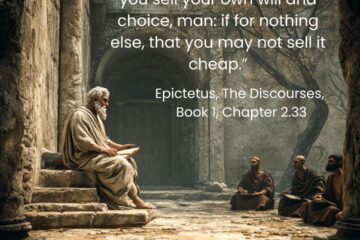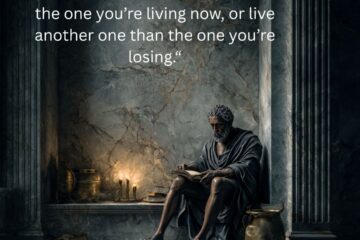What is the Dichotomy of Control

“Some things are in our control and others not. Things in our control are opinion, pursuit, desire, aversion, and, in a word, whatever is our own action. Things not in our control are body, property, reputation, command, and, in one word, whatever is not our action.”
Epictetus, Handbook, 1
Few ideas in Stoicism are as striking as Epictetus’s opening line of the Handbook. Known today as the “dichotomy of control,” this principle forces us to draw a line around what is truly ours and what belongs to fate. Pierre Hadot, in The Inner Citadel, calls it the exercise of the delimitation of the self. It is not a slogan but a spiritual exercise, a way of defining our freedom and our responsibility each day.
This practice remains powerful because it clashes with a deeply human impulse: our desire to shape the world according to our wishes. We constantly try to bend events, people, and outcomes to our control. Sometimes it feels like it works, until the moment life resists us. Then the reality of Nature strikes, and we discover that our peace of mind has been tied to what was never ours to begin with.
The delimitation of the Self
Hadot explains the concept of how to delimit the self:
“The general principle which presides over the exercise of the delimitation of the self, was formulated by Epictetus, and placed by Arrian at the beginning of his Manual: the difference between the things that depend on us and the things that do not depend on us. In other words, it is the difference between inner causality, or our faculty of choice: our inner freedom, and external causality, that is to say, Destiny and the universal course of Nature.”
Pierre Hadot, The Inner Citadel, Chapter 6, p. 173
This is not just about stress management or personal productivity. To recognize what depends on us is also to recognize what belongs to the whole of Nature. My prohairesis, my moral choice, is mine. Everything else belongs to the order of the cosmos. The discipline of desire is therefore inseparable from the cosmic perspective: by renouncing externals, I align my will to the rational order of the universe.
Hadot goes further:

“The first step in the delimitation of the ego consists in recognizing that, of the being which I am, neither the body, nor the vital breath which animates it, is mine in the proper sense of the term.”
Pierre Hadot, The Inner Citadel, Chapter 6, p. 173
This uncompromising move is what Epictetus insists on. We do not own our body, our health, our property, or our reputation. We may influence them, but influence is not ownership. What is truly ours is the power of judgment, assent, and choice. As Epictetus examines with one of his students:
“‘Are these your best possessions [body, gold, silver, clothes] or do you possess something else that is better than all of them?’ – ‘What do you mean?’ – ‘Something which makes use of these, and tests them and deliberates about each of them?’ – ‘What, do you mean the soul?’ – ‘You suppose right; for indeed I do mean that.’”
Epictetus, Discourses, Book 2, Chapter 12.20–22
The dichotomy is therefore a moral boundary: not between what I can and cannot manipulate, but between what belongs to my soul and what belongs to Destiny.
The Uncompromised Dichotomy of Control
Modern interpreters sometimes soften this teaching. William Irvine restates it as a “trichotomy of control”:
“There are things over which we have complete control, things over which we have no control at all, and things over which we have some but not complete control.”
William Irvine, A Guide to the Good Life, Chapter 5, p. 89
This framing appeals to modern intuitions; it makes the philosophy sound more practical. But it weakens Epictetus’ radical demand. We do not have “some” control over externals; we have none. We only have control over our own actions. Irvine’s tennis example illustrates this: we cannot control winning, but we can control how we play. Where Irvine looks at this and sees that we can influence the outcome, for Epictetus, this is not the case. What matters is why we do what we do. In the case of a game of tennis, it is to play with focus, fairness, and effort, to fulfill Nature’s demand of us in that moment. Whether it results in victory or defeat is irrelevant.
This is why Epictetus was so uncompromising. The minute we make outcomes part of our why, we surrender our freedom. The why of Stoic action is always moral choice. Winning, status, or health cannot be our true goal. Our goal must be to keep our prohairesis aligned with virtue and nature to safeguard our most prized possession: the rational soul.
Marcus Aurelius echoes this uncompromising spirit:
“Things have no hold on the soul. They have no access to it, cannot move or direct it. It is moved and directed by itself alone. It takes the things before it and interprets them as it sees fit.”
Marcus Aurelius, Meditations, Book 5.19
Practical Exercises

1. Draw the Boundary
Each morning, write down one thing you desire or fear. Then divide it:
- Inside: your choice, effort, judgment.
- Outside: the outcome, other people’s actions, chance.
This sharpens the line between soul and world.
2. Change the Why
Before you begin a task, ask: Why am I doing this? If the answer depends on an outcome (winning, recognition, wealth), reframe it. Choose a why rooted in your prohairesis: justice, fairness, courage, or focus.
3. Cosmic Alignment
Pause during the day to recall: everything outside your soul belongs to Nature. When faced with frustration, remind yourself that the universe has claimed what was never yours. Your task is to respond in harmony with reason.
Final Reflection
The dichotomy of control is not a theory of efficiency. It is a discipline of the soul. By practicing the delimitation of the self, we free ourselves from the tyranny of externals and return to what is truly ours: our moral choice. Epictetus demands we be uncompromising. Hadot reminds us that this delimitation is also a submission to the order of the cosmos. To live well is to accept our place in Nature, to guard our judgments, and to let the world unfold as it must.
Book a free consultation with one of our Stoic Coaches to get support. Or read more about How to Practice Stoicism here. Listen to the Via Stoica Podcast on Spotify, Apple Podcasts, or YouTube.
FAQ
What does the Stoic dichotomy of control mean?
It is the idea, taught by Epictetus, that some things depend on us (our judgments, choices, and actions) while everything else does not (our body, possessions, reputation, and external events). Freedom comes from focusing only on what truly depends on us.
Does Stoicism teach that we should stop caring about the world?
No. Stoics care deeply about justice, courage, and fairness. They still act in the world, but they do not attach their happiness to results they cannot control. The focus is on doing the right thing, not on guaranteeing outcomes.
Can I really control my mind when bad things happen?
You cannot stop painful impressions from arising, but you can decide how to respond. The Stoics call this power prohairesis, the ability to choose your judgment and action even in difficulty.
What about things I can influence, like my health or career?
You can act wisely to improve them, but the final outcome is never guaranteed. Influence is action, and action belongs to you. Results belong to fate.
Isn’t this way of thinking too strict for modern life?
It can feel demanding, but its strictness is what makes it powerful. The more firmly you draw the line between what is yours and what is not, the less vulnerable you become to frustration, anxiety, and disappointment.



0 Comments